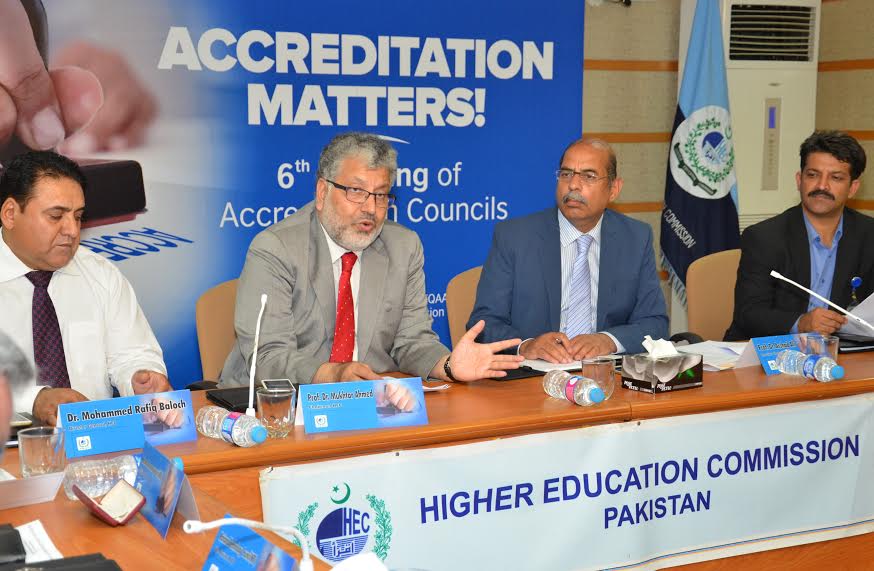ISLAMABAD ( BMZ REPORT )
The Higher Education Commission (HEC) Pakistan organized 6th meeting of all the Accreditation Councils to discuss various accreditation issues pertaining to different disciplines, universities and their campuses.
Dr. Mukhtar Ahmed, Chairman HEC chaired the meeting which was attended by Dr. Arshad Ali, Executive Director HEC, Mr. Rafique Baloch, Director General Quality Assurance Agency (QAA), Mr. Nasir Shah, Director QAA, and heads and representatives of all the Accreditation Councils including Pakistan Engineering Council, Pakistan Medical and Dental Council, Pakistan Veterinary Council, Pakistan Nursing Council, Pakistan Council for Architecture and Town Planners, Pharmacy Council of Pakistan, Pakistan Bar Council, Pakistan Council for Homeopathy, National Council for Tibb, National Agriculture Education Accreditation Council, National Business Education Accreditation Council, National Computing Education Accreditation Council, and National Accreditation Council for Teacher Education.
Speaking on the occasion, Dr. Mukhtar Ahmed stressed the need for close coordination and joint effort to ensure quality of higher education in the country. “The two most important issues facing the higher education sector are quality and governance in universities. We have to put joint efforts to address these challenges,” the Chairman underlined.
He also urged the Accreditation Councils to avoid issuing conditional NoCs to universities or their campuses to launch new programmes, as this practice risks future of students if the University fails to meet the criteria. He also emphasized conducting joint review of programmes by HEC and the respective Accreditation Council.
Dr. Mukhtar Ahmed said the world is opting for virtual facilities instead of building physical laboratories, however the need for tangible facilities in Pakistan cannot be neglected. He said the universities should be convinced to share facilities within their departments, as setting up separate laboratories, libraries and other facilities for every department is impossible. “HEC has spent Rs. 225 billion on building infrastructure in institutions for the last 12 years,” he said.
He urged the Accreditation Councils to address universities’ complaints about visit charges. “The Accreditation Councils are professional bodies not meant for policing over universities but to facilitate them.”
Expressing concerns over shifting of medical colleges once again to annual study system, he directed the PMDC to ensure implementation of semester system as required internally. Underlining the significance of standardized training of Accreditation Councils, he said that HEC may hire foreign experts to conduct trainings.
The meeting also discussed Minutes of the 5th Accreditation Councils meeting and reviewed progress on their implementation. The participants discussed Outcome based Education, advertisements about non-accredited programmes by universities, university rankings, self-assessment reports, issues of National Curriculum Review Committee, MoUs of Accreditation Councils with HEC, and quality of all educational programmes including PhD.
It was agreed that programme ranking should replace university ranking so that accuracy is ensured. It was also decided that every Accreditation Council will have representation in the Committee meant for ranking. In order to accelerate the operations of Accreditation Councils and stop anomalies, it was decided that Councils meeting will be held after every six months now onwards, while the Councils’ sub-committees will hold quarterly meetings.
As HEC is working on MTDF-III, Dr. Arshad Ali directed to share the plans of MTDF in the next meeting scheduled for January 2017. He also urged the Accreditation Councils’ Sub-committees to present summary of progress made in their meetings.

